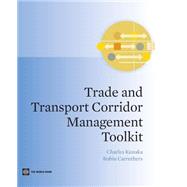- ISBN: 9781464801433 | 1464801436
- Cover: Paperback
- Copyright: 5/7/2014
Trade and transport corridors—major routes that facilitate the movement of
people and goods between regions and between countries—have existed for
millennia. They enable regions and countries to offer high-capacity transport
systems and services that reduce trade and transport costs by creating economies
of scale. Regional corridors are particularly important to landlocked countries,
often providing the only overland routes to regional and international markets.
Despite a long and complex history, guidance is often lacking on how to design,
determine the components to include, and analyze the impact of corridor projects.
The Trade and Transport Corridor Management Toolkit fills this void.
The Toolkit synthesizes the experiences of the World Bank and other development
agencies in assessing, designing, implementing, and evaluating the impact
of trade and transport corridor projects. It saves project developers the task of
looking for the best available tools and ensures greater consistency to facilitate
comparison and benchmarking.
The Toolkit will also be of immense value to policy makers in provincial and
national governments as well as regional economic institutions, for several reasons:
• Corridors affect the space economy of countries; they are best developed with
clear estimates of the spatial impacts that can be expected.
• A corridor system has multiple components, including infrastructure (roads,
railways, ports), transport and logistics services, and regulations; it is important
to appreciate the linkages between them, particularly as the overall performance
of a corridor is determined by the weakest component.
• Many parties with varying interests and motivations have a stake in corridor
development. The Toolkit argues for their full participation in corridor
development processes and operations.
The best functioning modern corridors in the world did not happen by accident;
they are often the results of coordinated development and cooperation over many
years. The general principles outlined in this Toolkit should help project teams,
government officials, logistics service providers, and the trade community
to better appreciate both the importance of good corridor project design and
the challenges of, and possibilities from, improving corridor performance.







